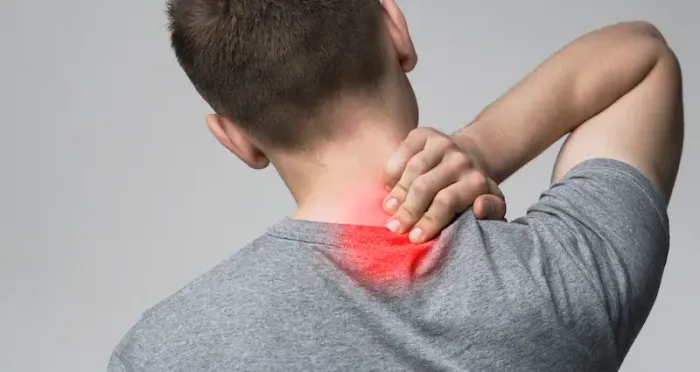Neck Pain; When to See a Doctor and When to Wait
Learn when neck pain is serious, home remedies, red flags, and when to consult a doctor for effective treatment and relief.


Introduction
That nagging ache in your neck—it’s a common complaint for millions. Whether it’s from staring at a screen too long, sleeping in an odd position, or a sudden twist, most neck pain is minor and fades within a few days. But how do you know when your discomfort is a sign of something more serious? Ignoring certain symptoms can lead to complications, while rushing to the ER for every crick can be unnecessary. This guide will help you decode your neck pain, outline effective home remedies, and, most importantly, clarify the critical "red flags" that mean it’s time to see a doctor. We’ll help you navigate the difference between typical soreness and a signal that your body needs professional medical attention.
Understanding Your Neck Pain: Common Causes and Types
Neck pain isn't a single condition; it's a symptom with many potential sources. Understanding the common causes can help you better describe your pain to a healthcare provider and identify its likely origin.
Muscle Strains and Sprains (The Most Common Culprit)
This is the everyday neck pain most people experience. It’s often caused by overuse or acute strain. Poor posture while working at a desk, hunching over your phone ("text neck"), or even grinding your teeth at night can strain the muscles and ligaments in your neck. A sudden force, like whiplash from a minor fender-bender, can also cause a sprain.
Wear-and-Tear: Osteoarthritis and Cervical Spondylosis
Just like any other joint, the joints in your cervical spine (neck) can wear down over time. Cervical spondylosis is a general term for this age-related wear and tear affecting the spinal discs in your neck. As the discs dehydrate and shrink, signs of osteoarthritis can develop, including bone spurs that can cause pain and stiffness.
Nerve Compression: Pinched Nerves and Cervical Radiculopathy
When the spaces where your nerves branch out from the spinal cord (foramina) narrow, the nerves can become compressed or "pinched." This is often due to a herniated disc or a bone spur. This compression can cause cervical radiculopathy, characterised by pain that shoots down into your shoulder or arm, and is often accompanied by numbness or weakness. This is a key sign that your issue may be more than a simple muscle strain.
The Role of Posture and Lifestyle
Our modern lifestyle is a significant contributor. Consistently poor posture shifts your head forward, placing immense strain on your neck muscles. For every inch your head moves forward, the effective weight on your neck muscles increases by 10 pounds. This constant strain is a primary driver of chronic neck pain and headaches.
The Red Flags: When to See a Doctor Immediately for Neck Pain
While most neck pain is benign, certain symptoms are major red flags that require urgent medical evaluation. Do not wait to see if these get better on their own.
After a Major Injury: Car Accidents and Falls
If your neck pain follows significant trauma, such as a car accident, a high-impact sports collision, or a fall from a height, you must seek immediate care at an emergency room. The primary concern is ruling out a fracture, dislocation, or spinal cord injury. Even if the pain seems minor at first, the adrenaline from the event can mask serious symptoms.
Neurological Symptoms: Numbness, Tingling, and Weakness
This is one of the most important signs. If your neck pain is accompanied by radiating pain, numbness, tingling ("pins and needles"), or weakness that travels down your arms or legs, it suggests nerve involvement. Weakness, especially—like having trouble gripping a coffee cup or lifting your arm—is a definitive sign that you need prompt medical attention from a neurologist or orthopaedic specialist.
Systemic Symptoms: Fever, Headache, and Stiff Neck
A combination of neck stiffness, a high fever, and a severe headache can be a sign of meningitis, a serious infection of the membranes surrounding the brain and spinal cord. Meningitis is a medical emergency that can become life-threatening very quickly. If you cannot touch your chin to your chest due to stiffness and have a fever, go to the ER immediately.
Loss of Bowel or Bladder Control (A Critical Emergency)
This is the most severe red flag. The sudden onset of incontinence, along with numbness in the saddle area (between the legs) and significant weakness in the legs, could indicate cauda equina syndrome. This is a severe compression of the nerve roots at the end of the spinal cord and requires emergency surgical intervention to prevent permanent paralysis.
The Yellow Flags: When to Schedule a Doctor's Appointment Soon
Not all concerning neck pain is an emergency. These "yellow flags" indicate you should schedule a non-urgent appointment with your doctor or a specialist for a proper evaluation.
Persistent Pain That Won't Quit
If your severe neck pain hasn't improved after a week or two of consistent self-care (rest, OTC pain relievers, heat/ice), it's time to get it checked out. Chronic neck pain that lingers for weeks or months warrants a professional diagnosis to identify and address the underlying cause.
Pain That Radiates Down Your Arm or Shoulder
As mentioned, radiating pain is a sign of potential nerve compression. If the sensation is mild—aches and tingles without significant weakness—it’s not typically an emergency but still requires a doctor's visit. A doctor can perform tests to pinpoint the affected nerve and recommend physiotherapy or other pain management strategies.Consult a Specialist for the best advice
Headaches Linked to Neck Discomfort
Many headaches, especially tension headaches and cervicogenic headaches, originate from the neck. If you frequently experience headaches that seem to start at the base of your skull and radiate forward, your neck is likely the source. A doctor can help confirm this link and suggest targeted treatments beyond standard headache remedies.
Pain That Disrupts Your Sleep Nightly
Occasional discomfort from sleeping wrong is normal. But if you consistently wake up every night due to neck pain and headache, or can't find a comfortable sleeping position, it's a sign that the issue needs addressing. This chronic sleep disruption can affect your overall health and is a valid reason to seek help.
Effective At-Home Remedies for Minor Neck Pain
For common muscle aches without red flags, try these conservative methods for a few days.
The Power of Rest and Gentle Movement
Avoid activities that aggravate the pain, but don't resort to complete immobilisation. Gentle movement prevents stiffness. Try slow, controlled neck stretches: gently tilt your head side to side and forward and back, stopping at the point of tension, not pain.
Heat vs. Ice: Which to Choose and When
This is a common question. Use ice for the first 24-48 hours after a new, acute injury to reduce inflammation and numb sharp pain. After 48 hours, or for general stiffness and muscle spasms, switch to heat. A warm shower or heating pad can relax tense muscles and improve blood flow.
Over-the-Counter Pain Relief Options
Nonsteroidal anti-inflammatory drugs (NSAIDs) like ibuprofen or naproxen can reduce both pain and inflammation. Paracetamol can help with pain but doesn't address inflammation. Always follow the dosage instructions on the label.
Ergonomic Adjustments for Your Workspace
Prevention is key. Set up your desk so your computer monitor is at eye level. Use a headset for long calls instead of cradling the phone. Choose a chair with good lumbar support. These small posture correction changes can prevent pain from recurring.
What to Expect When You Visit the Doctor
If your symptoms warrant a visit, knowing what to expect can ease anxiety.
The Physical Examination: Checking Your Range of Motion
The doctor will start by asking about your medical history and the specifics of your pain. They will then perform a physical exam, checking your neck's range of motion (how far you can turn and tilt your head), looking for areas of tenderness, and testing your muscle strength and reflexes in your arms and hands.
Diagnostic Tests: X-Rays, MRIs, and CT Scans
If a structural issue is suspected, imaging may be ordered.
X-rays can show bone alignment, fractures, and arthritis.
MRI scans provide detailed images of soft tissues, including discs, nerves, and the spinal cord, and are best for suspected nerve problems or infections.
CT scans combine X-rays to create cross-sectional images of the spine.
Discussing Your Treatment Plan: From Physiotherapy to Medication
Based on their findings, the doctor will recommend a treatment plan. This is rarely surgery first. It often includes a referral to physiotherapy to strengthen supporting muscles, prescription medications like muscle relaxants or stronger anti-inflammatories, or corticosteroid injections to reduce inflammation around a nerve. If your condition does not improve after trying these methods, you may want to seek a second opinion or discuss further options with a specialist you can book a physical visit to a doctor with Apollo24|7.
Conclusion
Neck pain is an almost universal experience, but it demands a smart, informed response. Listening to your body is the most important skill. You can confidently manage minor stiffness and aches at home with simple remedies. However, recognising the more serious symptoms—the red flags of radiating weakness, trauma, or systemic illness—is crucial for protecting your long-term health. Never ignore these warning signs. When in doubt, err on the side of caution and consult a medical professional. They can provide a proper diagnosis and a path to effective treatment, helping you return to a life free of pain. If symptoms persist beyond two weeks, consult a doctor online with Apollo24|7 for further evaluation and to discuss your treatment options.Consult a Specialist for the best advice
Consult a Specialist for the best advice

Dr. Vivek D
General Physician
4 Years • MBBS
Bengaluru
PRESTIGE SHANTHINIKETAN - SOCIETY CLINIC, Bengaluru

Dr Syed Mateen Pasha
General Physician
2 Years • MBBS
Bengaluru
PRESTIGE SHANTHINIKETAN - SOCIETY CLINIC, Bengaluru

Dr. Syed Ismail Ali
General Practitioner
7 Years • MBBS
Hyderabad
Apollo 24|7 Clinic, Hyderabad

Dr. Debajyoti Goswami
Obstetrician and Gynaecologist
10 Years • MBBS,D.G.O(DNB),Adv. Infertility Tech.(AIIMS),Fellowship in Diabetes(U.K),Comprehensive Abortion Care(Govt. Of W.B), Certificate in Clinical Embryology(AIIMS, BHUBANESWAR)
Bankura
D.G Clinic, Bankura
(25+ Patients)

Dr. Johnson. S
General Practitioner
7 Years • MBBS MD(Preventive and social Medicine)
Pune
Apollo Clinic, Nigdi, Pune
Consult a Specialist for the best advice

Dr. Vivek D
General Physician
4 Years • MBBS
Bengaluru
PRESTIGE SHANTHINIKETAN - SOCIETY CLINIC, Bengaluru

Dr Syed Mateen Pasha
General Physician
2 Years • MBBS
Bengaluru
PRESTIGE SHANTHINIKETAN - SOCIETY CLINIC, Bengaluru

Dr. Syed Ismail Ali
General Practitioner
7 Years • MBBS
Hyderabad
Apollo 24|7 Clinic, Hyderabad

Dr. Debajyoti Goswami
Obstetrician and Gynaecologist
10 Years • MBBS,D.G.O(DNB),Adv. Infertility Tech.(AIIMS),Fellowship in Diabetes(U.K),Comprehensive Abortion Care(Govt. Of W.B), Certificate in Clinical Embryology(AIIMS, BHUBANESWAR)
Bankura
D.G Clinic, Bankura
(25+ Patients)

Dr. Johnson. S
General Practitioner
7 Years • MBBS MD(Preventive and social Medicine)
Pune
Apollo Clinic, Nigdi, Pune
More articles from Neck pain
Frequently Asked Questions
1. What kind of doctor should I see for chronic neck pain?
You can start with your primary care physician. They can often manage the issue and may refer you to a specialist like an orthopaedic (for bone/joint issues), a neurologist (for nerve-related pain), or a physiatrist (a physical medicine and rehabilitation specialist).
2. Can stress and anxiety cause neck pain?
Absolutely. Stress and anxiety often lead to unconscious muscle tension, particularly in the neck and shoulders. This can result in chronic tightness, pain, and tension headaches.
3. Is a pinched nerve in the neck serious?
It can be. While many cases improve with conservative treatment, a severely pinched nerve in the neck that causes significant weakness or progressive numbness requires medical attention to prevent long-term nerve damage.
4. How can I tell if my neck pain is from a muscle or a nerve?
Muscle pain is often described as a dull, aching, or stiff sensation localised to the neck and shoulders. Nerve pain (cervical radiculopathy) typically feels sharp, burning, or electric-like and radiates or shoots down into the arm or hand, often with tingling or numbness.
5. What is the best sleeping position for neck pain?
The best positions are on your back or side. If you sleep on your back, use a thinner pillow that supports the natural curve of your neck without propping your head too far forward. Side sleepers should use a firmer, higher pillow to keep their neck aligned with their spine. Avoid sleeping on your stomach.



.webp)